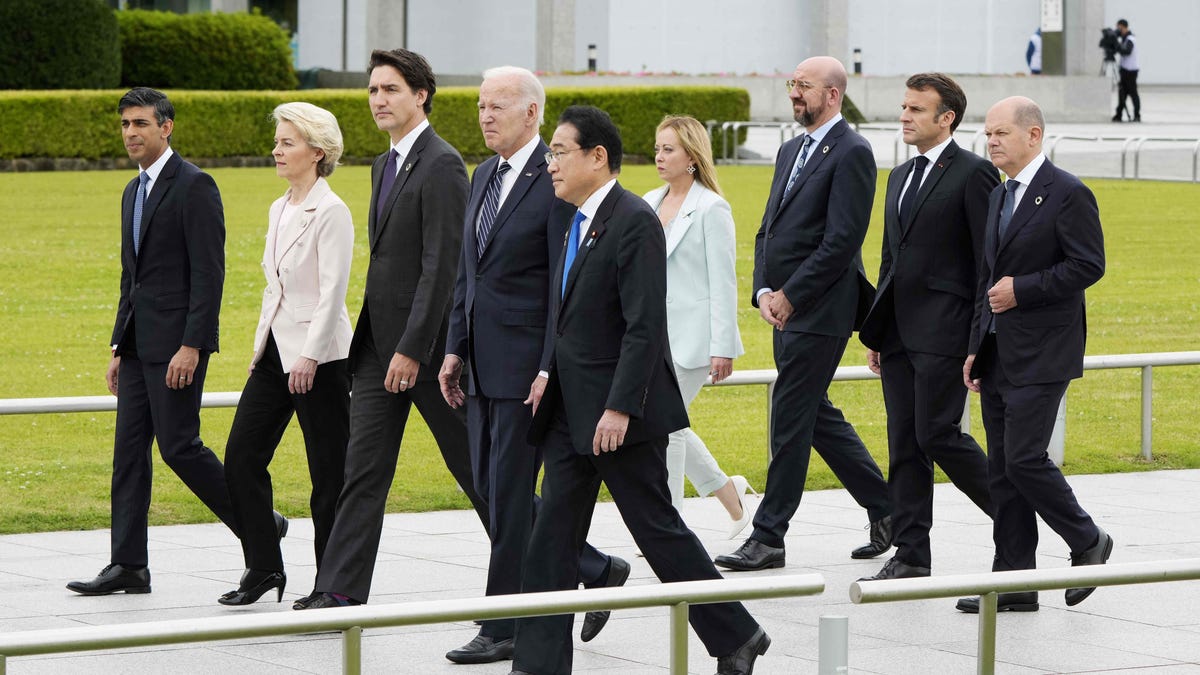President Volodymyr Zelenskyy will attend the Group of Seven summit in Hiroshima, Japan in person on Sunday, a trip that will mark one of the farthest distances he has traveled from Ukraine since Russia’s invasion.
Zelenskyy’s expected appearance at the annual meeting of leaders of the world’s most powerful democracies was confirmed by Oleksiy Danilov, the secretary of Ukraine’s National Security and Defense Council.
“We were sure that our president would be where Ukraine needed him, in any part of the world, to solve the issue of stability of our country,” Danilov said Friday on Ukrainian national television. “There will be very important matters decided there, so physical presence is a crucial thing to defend our interests.”
Neither the summit’s host − Japan − nor the U.S. has confirmed Zelenskyy’s attendance, though Ukraine’s leader did make a surprise visit to a summit of Arab leaders in Saudi Arabia on Friday, with assistance from France.
President Joe Biden is due to depart the summit on Sunday to return to Washington for debt ceiling talks that have at times that loomed over his overseas trip. He canceled stops in Papua New Guinea and Australia and departed a dinner on Friday before other G-7 leaders to receive a briefing on the budget negotiations.
Because of his canceled trip to Australia, the White House said Biden will meet with other members of the so-called Quad security pact − Australia, Japan and India − on Saturday evening while he is in Hiroshima. Biden will also sit down with Australian Prime Minister Anthony Albanese earlier in the day at a separate function.
Japan is about 5,000 miles from Ukraine. Zelenskyy traveled a similar distance to Washington, D.C. in December last year. The war in Ukraine is one of the top items on the agenda in Hiroshima. Zelenskyy’s attendance will come as G-7 countries − the United States, United Kingdom, Canada, France, Germany, Italy and Japan − unveiled fresh sanctions on Russia over its invasion.
Over the last week, Ukraine’s leader has undertaken a diplomatic blitz of Europe, visiting Germany, France, Italy and the U.K. to drum up military and financial support as Ukraine hopes to turn the tide of the war with a heavily signaled impending counteroffensive against Russian forces. Zelenskyy’s trip to Japan also comes as peace initiatives led by China and some African countries have been met with skepticism in Kyiv and western capitals.
“Nobody wants peace more than the Ukrainian people. We are on our land and (are) fighting for our future, exercising our inalienable right to self-defense,” Zelenskyy said in a phone call with China’s leader Xi Jinping last month. “There can be no peace at the expense of territorial compromises.”
‘Ukraine is alive and kicking’: Zelenskyy addresses Congress amid cheers, pledges of support
The news of Zelenskyy’s trip to Japan came as G-7 leaders gathered Friday morning to lay flowers at a peace memorial in Hiroshima that commemorates the approximately 70,000 people who died when the U.S. dropped an atomic bomb on the city, effectively setting in motion Japan’s surrender and the end of World War II.
Russian President Vladimir Putin’s nuclear threats against Ukraine, along with North Korea’s missile tests and China’s expanding nuclear arsenal, make nuclear disarmament a major part of the Hiroshima summit.
After a group photo near Hiroshima’s distinctive bombed-out dome, G-7 leaders issued a collective statement Friday that said they “remain united in imposing coordinated sanctions and other economic actions to further undermine Russia’s capacity to wage its illegal aggression.”
The Biden administration said it would blacklist 70 entities from receiving U.S. exports and introduce more than 300 new sanctions on individuals, entities, vessels and aircraft that would target financial facilitators and other actors in Europe, the Middle East and Asia.
As part of the sanctions, the U.S. said it is working to sever Russia’s access to architecture and engineering services. It also introduced sanctions on foreign nationals aiding Russia’s intelligence and military divisions and Russian officials accused of helping to facilitate the forced deportation and adoption of Ukrainian children.
“Our collective efforts have cut Russia off from key inputs it needs to equip its military and is drastically limiting the revenue the Kremlin receives to fund its war machine,” Treasury Secretary Janet Yellen said in a statement.
Putin wields a nuclear threat: Is it an empty one?
Britain unveiled punitive measures that will block imports of Russian copper, aluminum and nickel. It also banned imports from Russia’s lucrative diamond industry.
Australia said it would target Russian companies involved in nuclear research and weapons manufacturing. The European Union was focused on closing the door on loopholes, Charles Michel, president of the European Council, said.
The G-7 statement said that it would action to “further prevent the evasion and circumvention of our (sanctions) measures against Russia,” an acknowledgement that Russia has found at least some sanctions workarounds.


Comment (0)